This post may contain affiliate links.
If you’re a new RVer, you’re probably overwhelmed by the amount of information out there about RVing. When we became full-timers, we certainly were. In this post, we pieced together information about RV living that we learned since we hit the road in 2015. With so many new RVers these days, we wanted to share these RV tips for beginners all in one place.
If you’re reading this, and you’re a first-time RVer yourself, welcome! These RV tips for newbies are designed to get you started with enough information to get out there quickly and safely. Even experienced RVers can learn a thing or two here.
We’ve compiled links to our most helpful articles—and written some new content too—so that you can learn everything you need to know to get started as a new RVer . . . Without having to spend hours doing research.
If you’re looking to buy your first (or second or third) RV and need help, I offer one-on-one coaching. I can help you find the right RV for you and walk you through many of the things you may not have considered yet that only a seasoned RVer would know. I can also walk you through how to buy an RV and help you avoid common pitfalls which will save you money. Learn More Here.
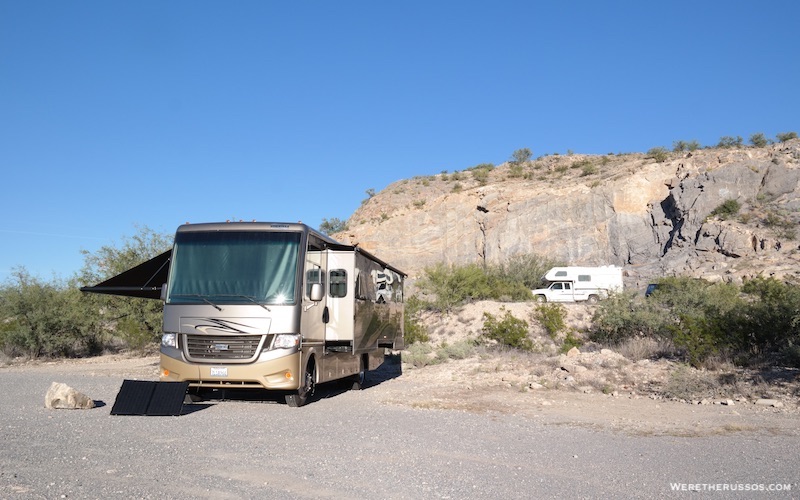
RV for Beginners – 16 Things to Know
#1: How to Shop For and Buy an RV
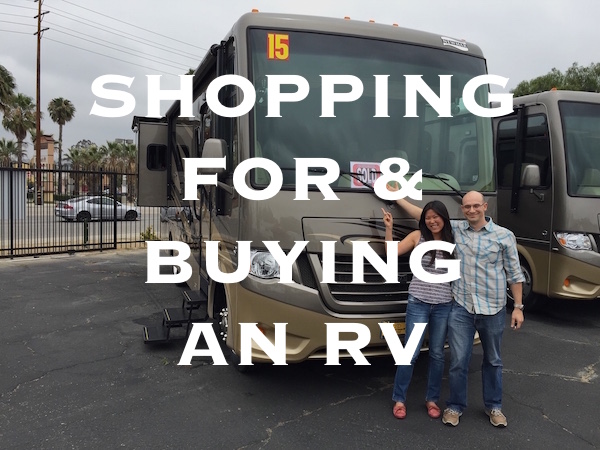
If you don’t own an RV yet, but are on the hunt for one, we’ve written a couple of articles on the subject already:
We’ve also have a library of RV, truck camper, and trailer tours on our YouTube page. If you want to see different brands and floor plans, check out these RV tours:
Because we’ve never towed our home, we don’t have any resources on how to match tow vehicles to trailers. But we’ve seen RVers led astray by salespeople who want to close deals. So if you’re shopping for a tow vehicle or a towable RV (or both), check out this article by Marc and Trish at Keep Your Daydream for safety information on GVWR and payload.
Which is the best RV? This is a question we get a lot and unfortunately it’s not something we’re able to answer. The best RV is the best RV for you. We can’t tell you what kind of RV is right for you, because that answer is different for everyone. We can tell you that there’s no such thing as the perfect rig, and you likely won’t find it the first time out. The best thing to do is to come up with a list of must-haves and figure out a rough idea of how you plan to use the RV. Then narrow down which RVs fit your must-haves and travel style. For example, a Class A RV that is great to spend a few weeks at a time at a campground is not going to be something you take overlanding and vice versa.
We started with a Class A motorhome towing a Jeep Wrangler and worked our way down to a 4×4 truck camper over time, because a small vehicle works best for our travel style. But there’s no way we could have known that when we first started. The important thing was that we picked the RV that worked best for us at the time.
#2: How to Rent an RV
If you’re not ready to commit to buying an RV yet, you can still enjoy the perks of RV travel by renting one. When we started researching RVs back in 2014, there were limited RV rental companies. Now, there are many options from local outfits that specialize in Class B vans to national rental companies like Outdoorsy and RVShare.
These large RV rental companies essentially provide a marketplace for RV rentals. Private owners list their campers for rent and you can search for the make and model of your choice, based on what’s available in your area. You can even search for specific brands that you’re interested in buying such as a Storyteller Overland MODE4x4 or a small travel trailer less than 3,500 pounds.
Maybe a luxury Class A motorhome or a fifth wheel toy hauler is more your style. Whatever RV you’re interested in renting, you can probably find it, it’s just a matter of price and availability.
Even if you do intend to buy, renting an RV is a good first step. It will give you a better idea of what it’s like to live in that space and better help you refine that must-have list I mentioned previously. We rented a Hymer Aktiv to travel around Maui and that was through Outdoorsy.
Read about our RV Rental Experience on Maui.
#3: A Tour of RV Types (or “Classes”)
If you’re a brand new RVer, the different categories of RVs can look very strange. What does “Class B” mean, and why is it smaller than a Class A and a Class C?
We remember how it felt to be a bit lost in these classifications as RV newbies, so before we go any further, we thought we’d share a quick overview of the different types of RVs out there:
Motorized RVs
- Class A: Our first RV was a Class A motorhome. These are the big rigs that look like buses, with a flat nose and large windshield up front. They can range from around 25 feet to 45 feet, and come in both gas and diesel models. Below is a walk-through video of our first RV.
- Class C: When you think of a classic motorhome, you probably think of a Class C RV. They have the cab-over bunk bed or storage and are built on a truck chassis, usually Chevy or Ford.
- Super C: It’s hard to miss Super C RVs on the road. They’re still built on a truck chassis, but the truck chassis is a heavy duty over-the-road semi truck like a Freightliner, so they look more like 18-wheelers than RVs. Below is a factory tour of a custom Super C manufacturer in Indiana.
- Class B+ / small C: “B plus” RVs are technically small Class C RVs, usually somewhere around 25 feet or less in length. They’re built on a van cutaway chassis like a Mercedes Sprinter or Ford Transit, but with a wider and bigger boxlike body than a standard van that allows for more interior space, and sometimes even slideouts. This video tour will give you an idea of a Class B+/Small C RV.
- Class B: Camper vans are Class B RVs and what we currently travel in. These RVs are built on different van chassis and van bodies, so they’re narrower and shorter than other motorized RVs. We have lived out of and tested various camper vans including 4×4 Sprinter and 4×4 Transit Class B vans, a custom Class B Van, and a front wheel drive ProMaster camper van. For a very brief time, we also live out of a DIY camper van that we built. To get a sense of camper van life watch one of our day in the life of videos below or head to our van life video playlist.
- Truck camper: A truck camper is exactly what it sounds like: a camper that sits in the bed of a truck. Watch our truck camper tour below or check out our truck camper life video series.
Towable RVs
We’ve never full-timed in a towable rig, but we’ve toured quite a few and know lots of other RVers who travel in various towable RVs.
- Fifth wheel: The largest towable RV. Fifth wheels got the name because the front pin of the trailer sits in the bed of the truck, so the truck axle functions as a sort of “fifth wheel.” They are tall and usually pretty long, between 30 and 45 feet. Despite their size, since the tongue weight of the trailer sits over the rear axle of the truck, it makes towing more stable.
- Travel trailer: Sometimes called “bumper pulls,” travel trailers hook up to a traditional ball hitch, so the weight of the trailer sits fully behind the truck rather than over the rear axle. Length for these can range anywhere from very short (like small teardrops trailers) to 30+ feet.
- Pop Up: Most travel trailers are hard-sided, but pop up campers save on height and weight by making use of collapsible canvas sides. As the name suggests, when you get to your campsite, you pop them up to full height for use. These can be towed by many vehicle since they are so light, and some pop up campers even come with all the amenities, including a bathroom. There’s a reason why pop ups have been the go-to camper choice of families for decades.
That’s a wrap on the different classes of RVs available. Let’s move on to the next section.
#4: How to Drive (or Tow) an RV
Driving an RV for the first time can seem scary. When we test drove our first RV, a 45′ Class A motorhome at an RV show, we were sweating! But we got comfortable in the driver’s seat pretty quickly.
Our best suggestion is to find a big, empty parking lot, and practice driving there. Practice tight turns to see how much room you need and watch how the rear (aka the overhang) of your RV swings out. Practice backing up, especially if you’re towing a trailer or a fifth wheel.
In short, get used to the way your RV moves and the space you require.
You can make this fun, too. Set up some cones or upturned buckets in a “slalom” pattern, and see how close you can get to them without actually hitting them or running them over with your rig.
By the time you’ve spent a couple of hours practicing, with no danger of damaging your rig or other vehicles, you’ll feel ready for the road. When you do drive, non-crowded highways are easiest. You won’t have tight turns, narrow roads, or traffic lights to worry about.
Even if you’re an experienced RVer—but especially if you’re first starting—we recommend using a pre-departure checklist before you travel. When you arrive, follow it in reverse order to set up camp. It’s the best way to make sure you don’t forget something important, like retracting the awning, latching drawers or unplugging your power cord from the pedestal, before you head down the road.
We don’t use this gadget anymore since our current rig is small (we have a Class B camper van), but when we first started in our Class A RV, an RV-specific GPS unit was indispensable. You can also use software like RV Life Trip Wizard to plan your route in advance.
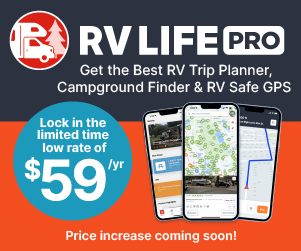
Bottom line, make sure you don’t attempt any road that can’t handle your RV’s dimensions. There’s nothing worse than approaching a bridge or low overhang and not being sure if it will clear your roof (and air conditioner!).
#5: Must-Have RV Gadgets
We created a round-up of must-have RV gadgets. But we know the cost adds up quickly when you start buying stuff to put in your new (or new-to-you) RV.
If you buy nothing else, make sure you have:
- Fresh water hose and a RV Water Filter for getting fresh water at the RV fill station
- Electric cord and adaptors—no matter what kind of electrical cord comes with your RV, it’s helpful to have enough adaptors that you can plug into 20, 30 and 50 amp outlets if you need to
- Surge protector / EMS to protect your RV’s electrical system if it does not come with one built in
- Sewer hose and clear elbow for dumping, if you have a black tank (more on sewer systems below)
- Leveling blocks
- Wheel chocks (if you have a towable RV)
If you love to cook like Kait does, don’t miss our recommendations for the 15 best kitchen gadgets for RVers. Cooking in an RV kitchen is different than cooking in a house, and requires some unique tools with limited space, so we share everything we’ve learned about cooking on the road. Including some fantastic recipes for every RV chef’s best friend: the Instant Pot.
#6: How to Find Campsites
We’ve probably written more about how and where to find great campsites than any other topic. It’s something we get asked about all the time, and it’s one of the things that intimidates new RVers most. Especially if they’re traveling without reservations, the way we do.
The first step in finding the right campsite for you is to identify your travel style. Do you prefer to boondock without hookups for free? Or do you prefer an RV resort experience like the one featured the video below, with lots of amenities, activities and a level concrete pad to park on?
Once you know what type of camping you prefer, you’ll know what to look for.
Here are a few of our favorite resources when it comes time to find a place to sleep in your RV:
- Top RV Travel apps: We put together a list of all of our favorite apps for RVing. Some of them will help you figure out where to spend the night. Others will help you save money on the road or keep an eye on the weather.
- Allstays: It’s on our top RVing apps list, but it bears repeating. You can find just about anything you might be looking for on Allstays: paid campgrounds, free campsites, propane, water, sewer dump . . . you name it. For more information, check out our Allstays Camp & RV App Review.
- Harvest Hosts: This is perfect for those who want to shop local AND find a beautiful place to stay. For a small annual fee, Harvest Hosts allows you to stay at farms, wineries, and other local spots. You usually don’t have hookups, but you might have a vineyard all to yourself for the night. To us, it’s well worth the trade. All the land owners ask in return is that you buy something from them in exchange. And who doesn’t want organic produce or local wine anyway? Read our Harvest Hosts Review.
- Dispersed camping on National Forest land: Sleep under the stars with no hookups, and often no neighbors. This is our preferred way to spend the night and we have quite a collection of videos and posts on the subject.
To read about some of the places we’ve camped in our RVs throughout the years, head over to
- our travel destinations page for a break down by state
- our collection of campground posts
In our first year as full timer RVers, we covered quite a bit of ground and assembled a list of our favorite RV campsites, both free and paid.
#7 Considering Solar for Your RV
If you’re interesting in doing more dry camping / boondocking then adding or increasing the amount of solar on your RV is something you’ll want to consider. Solar panels fall into two buckets: roof mounted and portable. Each have their advantages and disadvantages.
Our Portable vs Roof Top RV Solar Guide will help walk you through both types and what might work best for your situation.
#8: Internet for RVers
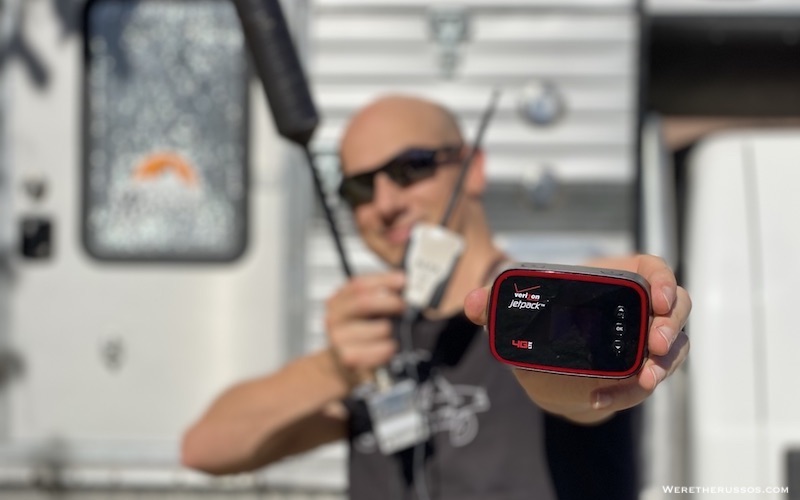
Internet connectivity is a big topic for nomads. Even retired RVers who just want to keep in touch with family and stream the occasional TV show have a lot of challenges. And if you are running a business or holding down a full-time job on the road, the stakes of getting internet connection right are high.
This is such an important topic that we wrote a Guide on RV Internet to help you stay connected.
#9 RVing with Dogs
When we first started RVing, we had two large dogs with us. We learned pretty quickly that it wouldn’t be as simple as putting the dogs in the RV and heading out for the next adventure. There was an acclimation period for them and for us when it came to travel days and living in the RV.
In our Beginner’s Guide to RVing with Dogs, we share tips and lessons to help you get started on RV travel with your four legged family members.
While we don’t have any dogs right now, we did quite a bit of RV travel around the United States with our dogs. There were times where we couldn’t explore a place we wanted to see with the dogs in tow, so we learned a lot about how to leave them behind safely. Some essential items made their way onto our must-have dog gadgets list for RVers.
If you are or will be traveling with a dog, check out some of our dog-friendly posts for ideas on places to visit and things to do. Here are few of our favorite dog friendly activities:
- Biltmore Estate in Asheville, North Carolina
- Bearizona Wildlife Park in Williams, Arizona
- Brewery Hopping in Fort Collings, Colorado
- Camping at Disney’s Fort Wilderness in Florida
- Petrified Forest National Park in Arizona
- Pima Air Museum in Tucscon, Arizona
#10: Hacks for Living Tiny
RV living is similar to tiny home living in many ways. And if you like the mobility of small RVs like ours, you have to get pretty creative on where and how to store things. Even if you’re in a 45 foot Class A diesel pusher you may find yourself benefiting from some of these tiny living hacks.
These are some of the ways we’ve stayed organized with two people in a small space.
#11 RV Toilets
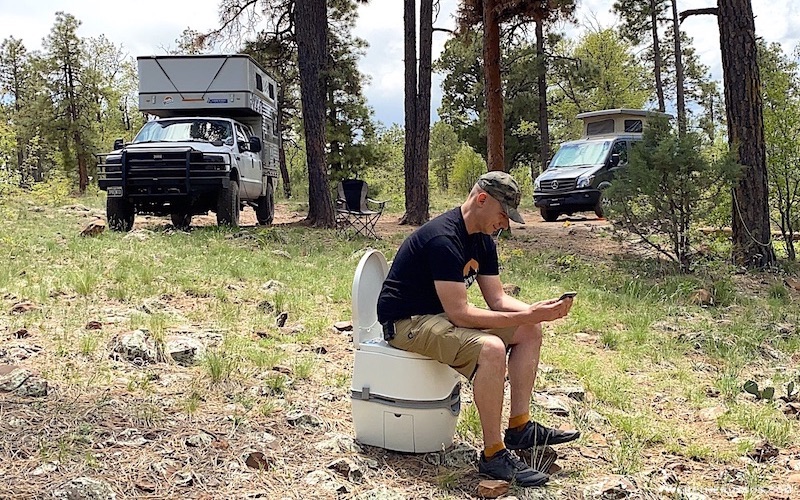
You probably already know that the plumbing and sewer systems in an RV operate differently than they do in a house.
Since you’re on the move rather than stationary, most RV toilets drain into a single holding tank (ominously called the “black tank”) rather than directly into the sewer system. What that means for you is that you’re going to have to empty your black tank or other type of RV toilet.
Luckily, RV dumping is not as bad as it sounds. Do it right, and it’s just a routine chore. Do it wrong and, well … Just read our tips on how to do it correctly.
We’ve owned several types of RV toilets ourselves, so we’ve written a lot of content on this topic. If you have a non-traditional RV toilet setup, or are trying to see if you’d prefer one, here are all of our potty-related posts:
- RV Toilets: A definitive guide to every type of RV toilet under the sun.
- Composting Toilets: Our very first RV toilet was a composting toilet! Here’s our overview of this popular and eco-friendly option for RVers.
- Cassette Toilets: What are they? How do you empty them? Is it terrible? All these answers, and more.
- Portable Camping Toilets: This is what we currently use in our truck camper. We share what it’s like to use a portable toilet, how it works, and more.
Oh, and if you want a to read all about our fling with a composting toilet, check out the post on our 2-week bucket toilet experience here.
#12 Travel Safety and Preparedness
Safety considerations on the road are a bit different than they are at home. The chances of a breakdown are much higher, since you’re likely driving more miles at a stretch—and bringing your whole house with you.
Add the element of being on the move and patchy cell signal in certain parts of the wilderness and you increase the need for being prepared. Since your family and friends may not always know exactly where you are, you need to be able to communicate with the outside world in case of an emergency or breakdown.
That’s why we wrote articles all about RV safety, must-have essential tools to carry in your RV, traveling with firearms in an RV and using a pre-departure checklist before driving off in your RV.
#13 Memberships
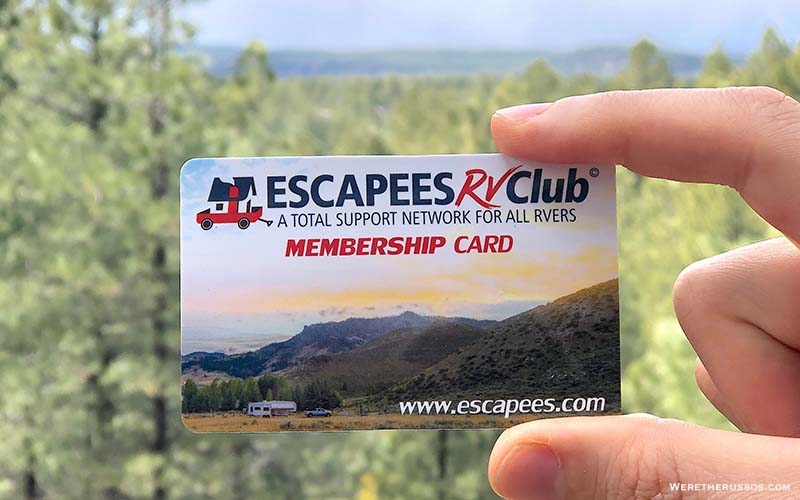
RV memberships can save you a lot of money if you use them wisely. They can also provide you with a built-in community, since you’ll run into like-minded travelers at member campsites like Harvest Hosts. Some memberships, like Escapees, even offer additional services like mail forwarding and permanent addresses for domicile. Check out our Escapees RV Club Review for more information.
This post highlights some of the RV memberships worth having.
#14 Getting Mail
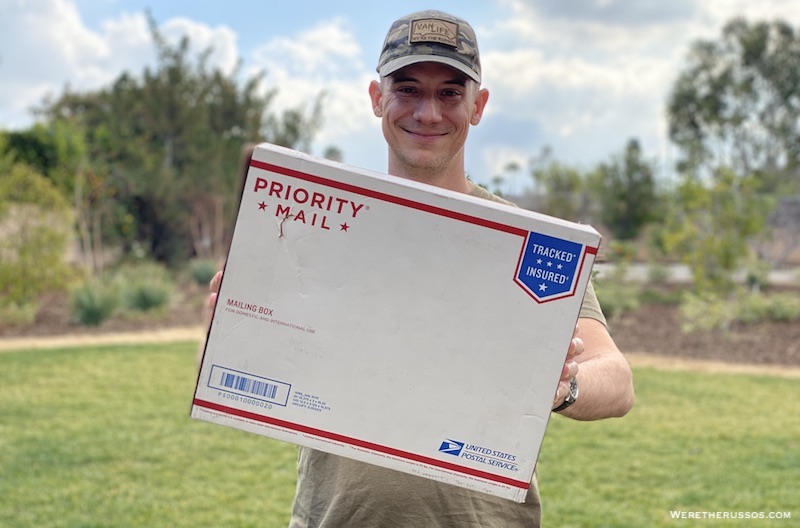
How to get mail on the road is one of the more popular questions we get asked. If you’re traveling for weeks or months at a stretch, or if you’re a full time RVer, receiving mail can be a bit of a challenge.
In this post we detail the different options for getting mail on the road as an RVer—you have more options than you think!
#15 Health Insurance
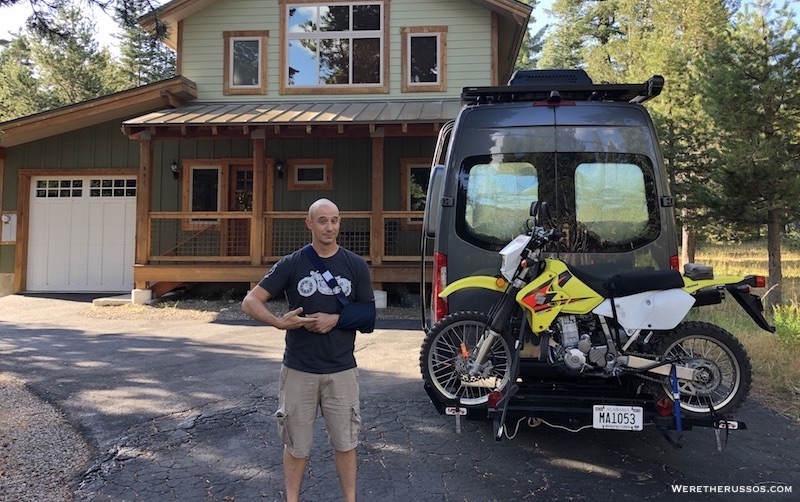
One of the most common topics of conversation around the campfire is insurance for full time RVers. We all hope that we won’t get sick on the road, but want to be prepared if something unexpected should happen. And frankly, navigating the world of full time RVers insurance can be pretty daunting, especially if you’ve never had to find insurance on your own.
In this article about RV Health Insurance, we discuss our experiences with health insurance on the road and available options for fellow RVers.
#16 Get More Use Out of Your RV
While there are plenty of full time RVers out on the road, there are way more part-time RVers who use their camper for weekend getaways or extended road trips. When these RVs aren’t being used for camping, they are likely sitting in storage somewhere waiting for the next adventure.
Since a drivable or towable RV can be quite a costly expense, here are some ways to get more use out of your RV.
Bonus Content
Since Kait and I started full time RVing in 2015, we’ve met a lot of people on the road and many have asked how we did and what advice we have. To help those questions and more, I self-published two books on RV living.
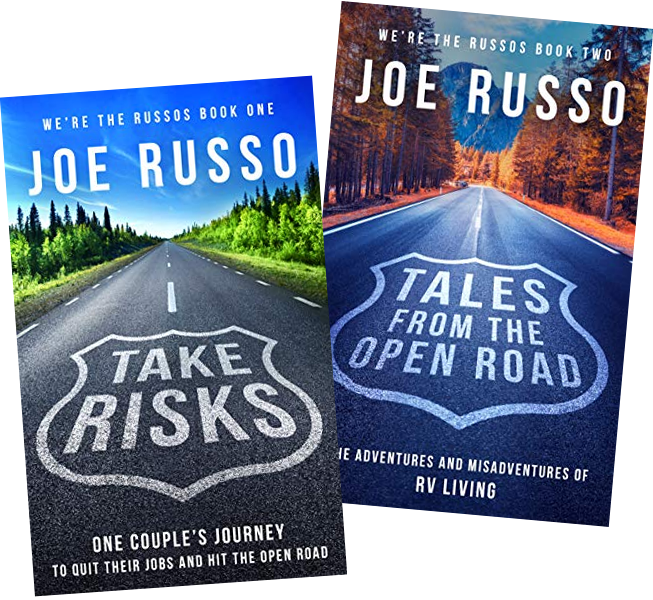
My first book, Take Risks chronicles our journey from coming up with the idea to become full time RVers to researching and shopping for RVs to buying our first RV and downsizing from a three bedroom house into a one bedroom condo on wheels.
My second book, Tales From the Open Road offers a personal account of the mostly good and sometimes challenging adventures (and misadventures) from out first year on the road.
Want to know how much it costs to live the RV lifestyle? We share our Cost of RVing on this page which includes a breakdown of our first year of RV Living costs and the first six months of camper van life. Your RVing costs could be higher, lower or similar based on factors such as cost of insurance, miles traveled along with fuel economy and the number of people in your RV household.
Summary
Phew—that was a lot of info and thank you for making it through our RV tips for beginners. As you’ve probably figured out, there’s a lot to learn about RVing, but don’t let it scare you.
If we can leave you with one thing, it’s this: it’s all completely worth it. You’ll pick up new skills you never knew you had, and you’ll see beautiful places in the process.
If you still have questions about RVing that didn’t get answered, let us know in the comments and we’ll try our best to answer them.
And to all the RV newbies out there: welcome! We look forward to seeing you out on the road.

Is there a website you would recommend for buying a good used class A ?
My go to is always RV Trader.
Have been tent camping for some time in my younger years. Now retired and purchased a couples camper and off to the bucket list.. The tips you give are going to be very helpful as this is out first real camper per say… LOL and our first trip is to visit our grandson in Michigan in 2 weeks, And then the big trip from Ohio to California and most all point in between. Wish me luck the first trip is gonna be about 5000 plus miler. But I am confident with all the tips and my driving skills are pretty good. Can’t wait.
Good luck!
I’ve been watching you for a while, hubby and I are going full time since retired. You guys helped me learn about rving thanks
I have a 2009 Sportsmobile campervan with 2 100ah solar panels on the roof. My AGM batteries after 6 years are not holding a charge for long, so i purchased 2 Lithium 100ah Battle Born Batteries LiFePO4 Deep Cycle Battery – 100Ah 12v with Built-In BMS – 3000-5000 Deep Cycle Rechargeable Battery. However, Battle Born says I would need to upgrade my solar comments; charger, inverter, etc. Can you do upgrades or know of any shop that does this type of upgrades? Mahalo Kimo
Hi Kimo – I would suggest finding a company who specializes in solar and battery set ups and consult with them about what components you need. I don’t know where in the world you are but Bend Battery has helped advise us on somethings and we found them to be very knowledgeable. The other option is to call Sportsmobile or Field Van (if your van was built at the Fresno, CA location – Field Van is the former Owners of the Sportsmobile shop at that location) and talk to them since they built your van and would be know.
Hi Joe, this is a great article for beginner RV’ers and some of the things that you point out aren’t things you’d think of unless you’ve spent time on the road, like getting mail!
One thing I didn’t see you mention in the shopping for an RV section is to have it get inspected by a great RV mechanic. I always recommend that you have a big purchase inspected by someone who knows what to look for. Thanks again, I found you on youtube thanks to this article!
Hi Kait and Joe,
I have learned from watching your YouTube videos and reading the information you both produce. I decided not to own an RV after you both had planned on selling your house and bought an RV and explained the details and issues that you were having with the RV. Than you both purchased a Van, and now a Ford Diesel pickup with a popup camper. I also had purchased your first book a while back. I am trying to search out on the internet to find what would be the best shelter to live in full time throughout the four seasons for me when I do retire and don’t want it to cost me more issues with it. I was thinking about purchasing a Mercedes Benz 4×4 Diesel 170 wheelbase dual wheels. I guess it’s top-heavy also the cost of maintenance issue when it’s in the dealer shop. I also thought of Airstream Trailers watching Videos on YouTube the Pros & Cons. I plan on traveling to fish and camp since I will not bring in all that much Social Society while retired. I don’t want to be trapped renting a room and not able to travel and do what I enjoy doing. Your Opinions or ideas?
I’m very seriously thinking of buying an RV for my 70th birthday in two years to see the places I’ve only seen from the air. I’ll be traveling alone and am looking for advice. My kids (37 & 40 year old daughters) are shitting bricks over this, like I’m feeble or something. I’m healthy and pretty adventurous and looking for other input…
Something that should be on that list that’s very important. How to properly load your rv and know the weight capacity. You don’t want to be overloaded on GVWR or your axle weight rating. It can cause handling and steering problems as well as blowouts if over weight